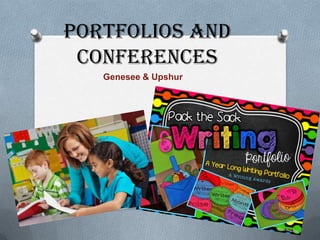
P & c y& y
- 1. Portfolios and Conferences Genesee & Upshur
- 3. PORTFOLIOS “Purposeful collection of student work that exhibits the student’s efforts, progress, and achievements in one or more areas.” (Del Vecchio et.al, 2000)
- 5. WHAT KIND OF WORK ARE KEPT IN PORTFOLIOS? Sample writing. Book reports. Tape recording of speaking List of books. Favorite short stories
- 6. Limited Portfolios that are constantly expanding and never cleaned out become difficult to store. Difficult to review.Difficult to assess. How much work should be kept in portfolios?
- 7. When and how often is work put in portfolios? Who has access to portfolios?
- 8. Using portfolios interactively O Sharing one´s accomplishment with others who are supportive and collaborative. O The use of portfolios is critically depending on: 1. Used interactively 2. Students´assuming ownership of them 3. Students´controlling the review process.
- 9. Making portfolios interactive 1. Include students in decision making 2.Plan portfoli0s conferences 3.Organize reviews. *Individual *Small groups or the whole class *By inviting parents 4.Discussion of students portfolios should be: -Positive -Collaborative -Under control of the students portfolios are being review. 5. Teachers should always adopt a: +Positive +Collaborative +Supportive attitude
- 10. Focus on what has not been done or what or wrong with what has been done. Be judgmental about students or goals. Take over discussion of students’ work.
- 11. Porfolios and students self -reflection 1. A brief note describing. 2. Allow students to control their own process. 3.Compare pieces of work. 4.Select their best work. 5.Be supportive, interested, and provide constructive feedback. 6.Ask students how they think they can strengthen weaknesses and what teacher can do to help. 7.Encourge students to reflect on their work in the presence of other student. 8.Ask students to comment on or write about keeping portfolios and how they help them learn better.
- 13. Using portfolios to plan instructions Responsive to students’ needs Plan regular conferences with students. Review students’ portfolios to monitor the impact of instruction. Listen carefully to students’ comments about difficulties. Engage students in joint goal setting and plans are incorporated into your instructions. Reviewing and responding to portfolios is time consuming.
- 19. CONFERENCE IS ANOTHER METHOD OF ASSESSMENT * planning *Identify successful problematic learning strategies *identify aspects of instruction *identify problematic aspects of language * understand students motivations and interests
- 22. CONFERENCING AND GRADING FOCUSES ON LEARNING OUTCOMES OR ACHIEVMENTS
- 23. RECORD KEEPING FACILITATE THE ASSESSMENT OF INDIVIDUAL DEVELOPMENT
- 28. STUDENT ANECDOTAL RECORDS REMIND STUDENTS OF ANY GOALS
- 31. QUESTIONS MAKE IN CONFERENCES 1. Conference about a single piece of writing . • Why did you select this piece of writing? • What things did you have difficulties in it? 2. Conference about reading selection. • why did you select this story? • what particularly like about this story 3. Conference about portfolio . • What kinds of materials have you included in your portfolio? • How do you plan to use your portfolio?
- 32. Guidelines for conducting conferences What do you like about this work ? What do you think you did well? How does it show improvement form previous work ? Can you show me the improvement? Did you have any difficulties with this peace of work ? Can you show me where you had difficulties? What did you do to overcome it? What strategies did you use to figure out the meaning of words you could not read? What did you do when you did not know a word that you wanted to write?
